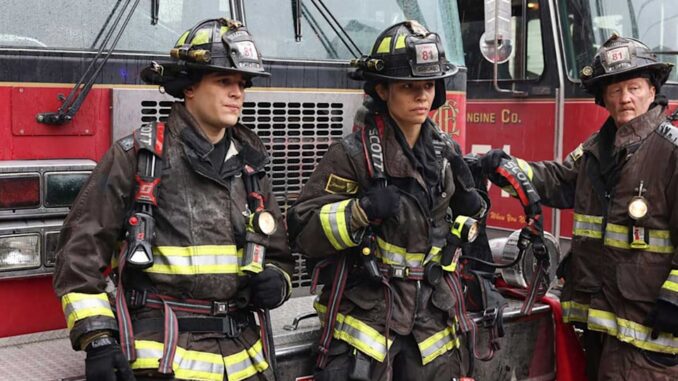
The Enduring Flame and the Shifting Sands: Chicago Fire Season 14 Confirmed, Who’s Leaving Firehouse 51 & What’s Changing
The collective exhale of relief could almost be heard across the nation’s living rooms as the news rippled through the fan base: Chicago Fire has been renewed for Season 14. For a show that has, for over a decade, served as a comforting anchor of weekly heroism and heartfelt drama, this confirmation is more than just a scheduling announcement; it’s a reaffirmation of a beloved institution. It means more shared meals in the common room, more heart-stopping calls, and more moments where the bonds of Firehouse 51 prove stronger than any inferno. Yet, embedded within this joyous pronouncement is the bittersweet tremor that always accompanies the promise of longevity in television: with renewal comes change. The unspoken question hanging in the air, a familiar refrain with every passing season, is "Who’s leaving Firehouse 51 and what will change?"
The longevity of Chicago Fire is a testament not just to its compelling episodic structure—the urgent sirens, the searing heat of the inferno, the palpable tension of a rescue—but to its carefully constructed ecosystem of characters. Firehouse 51 isn't just a workplace; it's a family. We've watched these individuals grow, fall in love, grieve, triumph, and fail, forging a connection with them that transcends the screen. Severide's unwavering loyalty, Boden's stoic wisdom, Stella's burgeoning leadership, Gallo's youthful zeal—these are not merely archetypes, but familiar faces in a narrative tapestry we've invested in. A Season 14 renewal signals that this vibrant heart continues to beat, promising further exploration of these beloved relationships and new challenges that will test their mettle. It offers the comfort of the known, a reliable hour of drama in an unpredictable world.
But the very nature of such a long-running ensemble dictates that the sands will inevitably shift. The landscape of a TV show is not static; it breathes, evolves, and sometimes, regrettably, parts ways with its integral components. The whispers of "who’s leaving Firehouse 51" are not born of malice, but of a deep, almost familial concern. Will it be a major character, a foundational pillar whose departure would send ripples through every storyline? Or a newer face, whose developing arc has just begun to bloom, leaving fans to wonder what might have been? The reasons for departure are manifold: actors seeking new challenges, creative decisions to invigorate stagnant storylines, or the brutal, often tragic, demands of a narrative that mirrors the life-or-death stakes of firefighting. Each exit leaves an empty chair at the kitchen table, a phantom presence in the locker room, and a void that, while eventually filled, is never truly forgotten. The ghosts of past characters—Shay, Otis, Gabby, Casey (even in his return visits)—linger in the hallways, reminding us that no one is immune to the march of time or the narrative’s imperative.
The "what's changing" aspect extends far beyond just personnel shifts. A long-running show must continuously reinvent itself to avoid stagnation, to keep the narrative fresh and compelling. With departures come new arrivals, fresh faces who inject new energy, new perspectives, and new dynamics into the established order. A new paramedic could challenge Violet's steady composure; a new candidate could bring unexpected humor or a mysterious past; a new lieutenant might introduce a different leadership style to the house. These new blood infusions are crucial, forcing existing characters to adapt, to grow, and to forge new bonds. Relationships will evolve: friendships deepen, rivalries may ignite, and new romantic pairings might blossom, shaking up the familiar comfort zones.
Beyond interpersonal dynamics, the very fabric of Firehouse 51 itself might undergo subtle but significant shifts. Perhaps a new piece of equipment demands a change in procedure, or a new city policy introduces a different kind of call. The nature of the emergencies they face could evolve, mirroring real-world events or exploring new facets of community service. Even the physical layout of the firehouse, subtly updated or redecorated, can symbolize the passage of time and the ongoing evolution of the place that is their second home. The challenge for the writers, and the hope for the audience, is that these changes, while sometimes jarring, ultimately serve to strengthen the core identity of the show: the unwavering dedication to saving lives, the unshakeable camaraderie, and the enduring spirit of heroism that defines Firehouse 51.
As Season 14 approaches, the news of its renewal brings a mixture of exhilaration and poignant anticipation. It’s the joy of reuniting with old friends, tinged with the knowledge that some familiar faces may be missing, and the landscape around them might look different. Yet, the enduring flame of Chicago Fire has always been its ability to adapt, to mourn its losses, and to embrace the future, all while holding steadfast to the core values that have made it a beloved staple for over a decade. Firehouse 51, in its essence, remains a beacon of courage and family, ready to answer the next call, no matter who answers with them. And for that, we, the audience, will keep watching.
